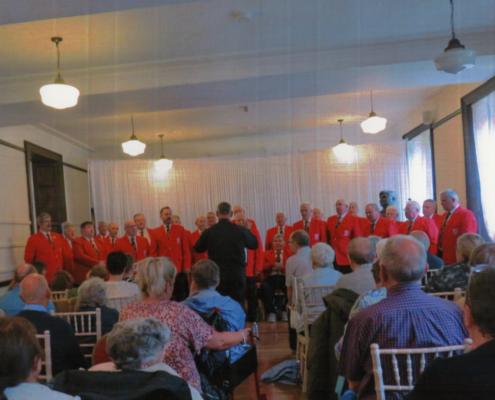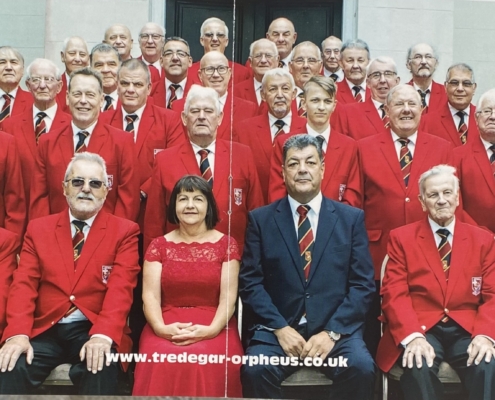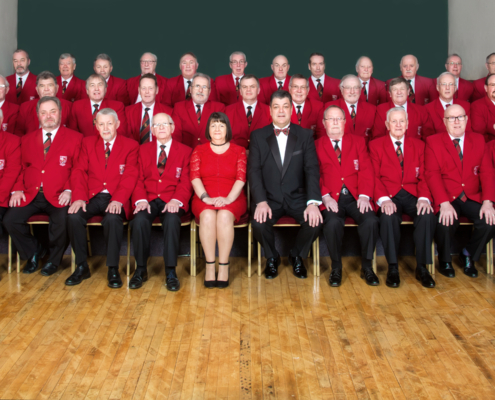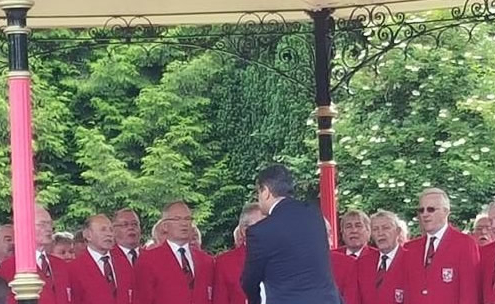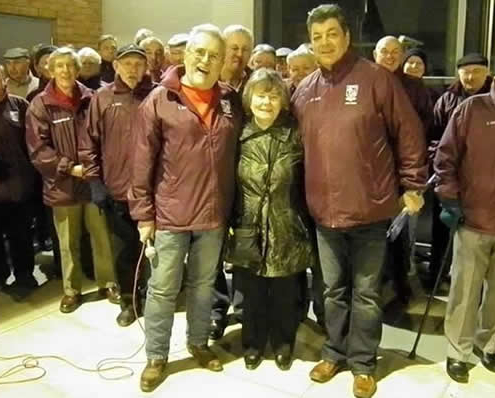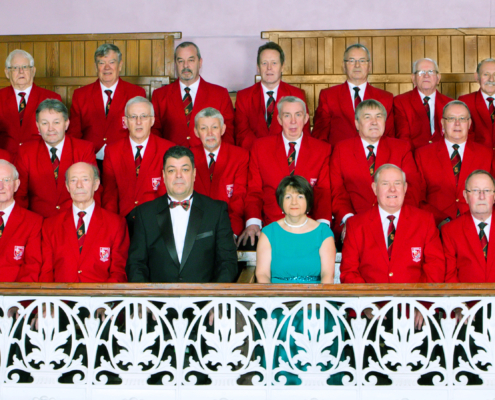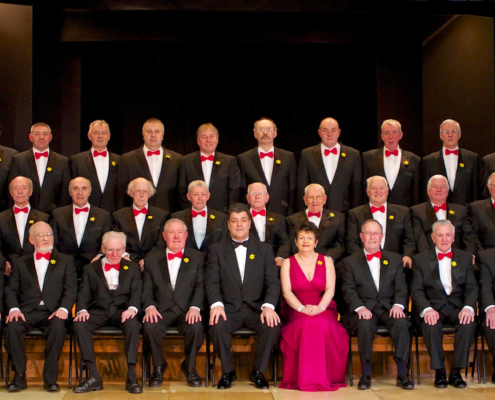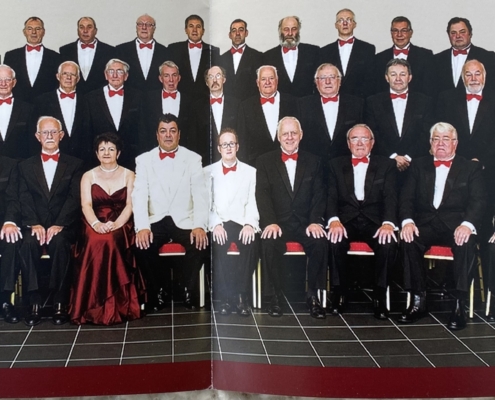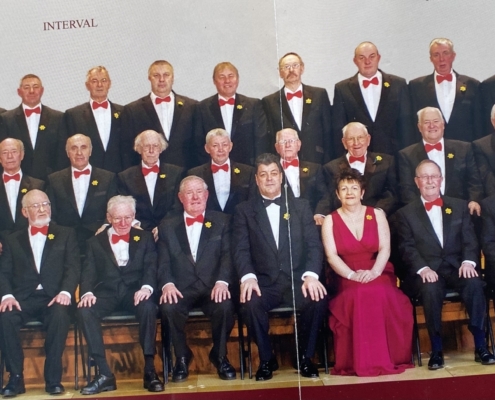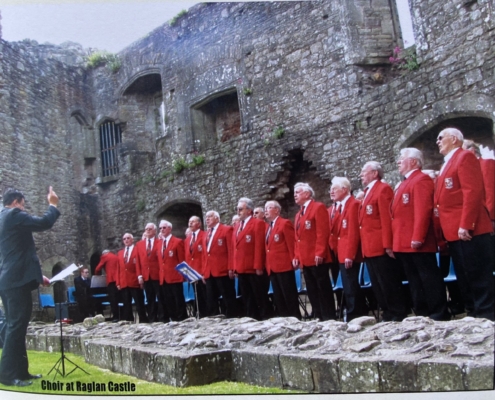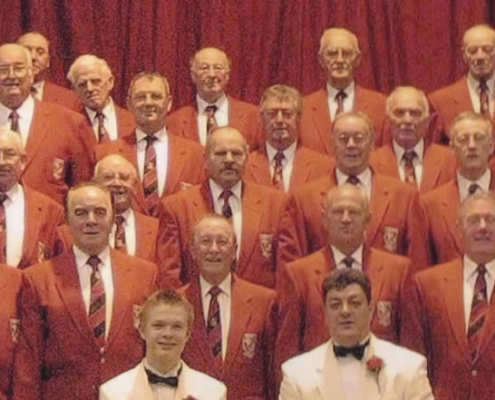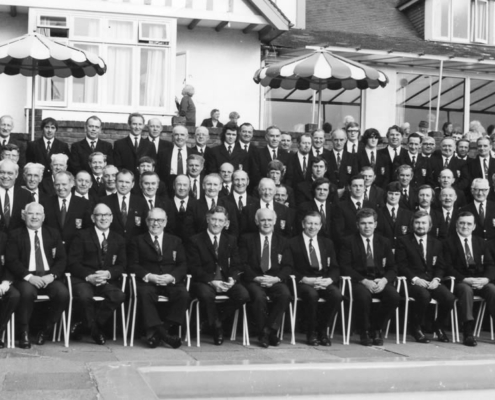Our History
Every story has a beginning. This is ours…
Every story has a beginning. This is ours…
How it Began
The choir was formed in October 1909 with about thirty members to enter an Eisteddfod in Tredegar which they subsequently won. The Tredegar Orpheus Male Voice Choir survived two World Wars and several crippling industrial strikes but continued to raise thousands of pounds for charity. The first 25 years of the choir was better known as the “John Davy” years who was the original conductor. This era was a story of success at Eisteddfodau. 71 first and second prizes were achieved, including a narrow defeat in the 1919 Corwen National Eisteddfod, as well as numerous concerts. In May 1920 outstanding concerts were given at the City Temple, the famous London Palladium, Alhambra, Finsbury Park and the Hammersmith Palace where these buildings resounded to the wonderful singing of the Orpheus. When Ieuan Davies took over the baton in the sixties, the choir grew in number and in the 1970’s boasted 145 singing members and again came a close second at the Ruthin National Eisteddfod in 1974 and gaining first prizes at Pontrhydfendigaid, Porthcawl and Kerry Newtown on several occasions. Concerts have been performed at many famous venues including The Dome, Brighton; Usher Hall, Edinburgh; Fairfield Hall, Croydon; and the QE2. During two visits to Plymouth, concerts were given in Dartmoor Prison, the first Welsh choir to do so. Tours to France and Germany were undertaken during this period. In 1993 Ian Waite was appointed conductor and under his leadership many concerts have been given, tours undertaken to Switzerland, Ireland, Canada and Germany. Now after 29 years of dedicated service Ian has retired and passed the baton to his brother Jonathan who leads us into our next era.
Tredegar Orpheus Male Voice Choir is warmly received wherever it sings, giving pleasure to many people.
Long may it continue to do so.
The choir popularly known as “Tredegar Orpheus” can trace its origin to the 1880’s when it was known as the Tredegar Male Voice Society.
In October 1909 a group of 20 or so men decided to form a glee party to take part in an eisteddfod which was being held on the 6th December 1909 at the Temperance Hall (Workmen’s Hall) Tredegar. They elected Mr John David Evans to be their conductor and Mr H E Badmington as their accompanist. Only two choirs entered, the other choir being Tredegar United conducted by Mr D Turner. The Tredegar Male Voice Society went on to win the competition; the test piece being ”In Absence”.
By mutual agreement of all concerned the name Orpheus, was adopted, “Orpheus” is the Greek God of music, thus the choir became known as the Tredegar Orpheus Glee Society. Their membership soon increased.
Originally named Tredegar Orpheus Glee Society.
The new conductor William Pearce had first joined the choir in 1912, but by 1914 he had taken on the duties of choir accompanist. He had gained a reputation of being an accompanist who possessed an outstanding natural ability.
At the choir’s third Annual Concert held at the Temperance Hall on 14 November 1912, the guest artistes charged the choir just half their usual fee to assist the choir in raising funds to attend a prestigious engagement in London the following year.
In 1918 there were at least four male voice choirs in Tredegar, the main choirs being – The Apollo Glee Party, conductor Mr A C Denham; Tredegar United Male Choir, conductor Mr Tudor Jones; Tredegar Town Male Choir, conductor Mr E R Edwards; and the Tredegar Orpheus Glee Society conducted by Mr J D Evans.
In 1918 the Orpheus Glee Society gained eight first prizes and three seconds gaining maximum marks from the adjudicators in two of these competitions, a truly remarkable achievement.
At a function held at the Mizpah Chapel Schoolroom Tredegar in February 1918, the choir honoured several of its members who were serving in the First World War.
The recipients were J W R Thomas; J Hildridge; W Jones; J Williams and Cyril Jenkins.
At this time, 29 members of the choir were serving in the Forces and sadly, one member, Frederick Bosley had made the supreme sacrifice.
The following is an account of his death:
On the afternoon of 2nd May 1915, a shell landed among the machine gun section. He was killed instantly. His brother, a corporal, was in the line close by and the following is the letter he wrote to his parents telling of the death of his brother:
I do not know how to write this letter, which is to convey such bad news and to give you all such a blow. Poor Fred was killed by a shrapnel bullet at about 4 p.m. on Sunday May 2nd. He died instantly. He and Lieut. Martin were killed by the same shell. They buried them in an open space by a wood and I followed his last remains to the grave where the Colonel read the burial service. I cannot write anymore. He came to me about twelve o’clock. I wish I had kept him with me.
Frederick Bosley was serving in the 3rd Battalion Monmouthshire Regiment and was 24 years old. His name is inscribed on the Menin Gate Memorial at Ypres.
In May 1918 a farewell concert was given by the choir at the Olympia to 40 members of the choir who had been called up to serve their King and country.
By 1919 the name had changed to the Tredegar Orpheus Male Voice Party.
The choir competed at the Crosskeys Eisteddfod, in April 1919 gaining first prize in what was described by the adjudicator as “a flawless performance”. The test piece was “Spartan Heroes”.
The 108 members of the choir travelling to Corwen to take part in their first National Eisteddfod in August 1919. The Eisteddfod Pavilion was filled to capacity with thousands of people listening outside. The test pieces were ”Y Cariad Gollwyd” (The Lost Love) and “Invictus”. The first prize was £50, second £25, third £10. The competition lasted for 4 hours. In their summing up the adjudicators described the Tredegar choir as being “Wales’ Premier Choir” with the winning choir being Nelson from Lancashire.
Another notable choir performance took place in November 1919, when under John David Evans the choir was awarded first prize at the Swansea Semi-National Eisteddfod; again singing “Invictus” and “Y Cariad Gollwyd”.
In August 1920, the Orpheus competed at the National Eisteddfod held in Barry. The competition was watched by 18,000 to 20,000 people. Tredegar choir were placed 3rd. There was another notable achievement for the choir, when in December 1920 at Cardiff, the choir competed for a first prize of £100 and a gold cup with a second prize of £50, presented by the Rt. Hon D. Lloyd George, the then Prime Minister.
The Tredegar and Maesteg choirs tied for first place, the adjudicator deciding to share the first and second prizes awarding each choir £75.
A fourth attempt was made to win the National by the Orpheus in August 1922. The winning choir was near neighbours Dowlais. Subsequent competition successes in 1923 were first prizes at Llanhilleth “King of the World” Blaina “The Crusaders” and Blackwood “Nidaros”.
The choir was engaged by the National Sunday League to give a series of concerts in London at the Palladium, the City Temple, Alhambra, Finsbury Park and the Hammersmith Palace. This was in May 1920.
Their first concert at the Palladium was to a capacity audience who was thrilled with their singing. In the evening they sung at three concerts, the first was at the Alhambra, which once again was sold out, the choir’s programme being thoroughly enjoyed by all who attended. The next stop was Finsbury Park, where once again they were greeted by an enthusiastic capacity audience who were delighted with the concert. Their final performance of the evening was at the Hammersmith Palace. This again proved to be a huge success with hundreds of people failing to gain admission to the concert.
Wonderfully appreciative audiences could not hear enough of this marvellous choir. At the end of the short concert tour, the choir returned to their hotel where they continued to sing, much to the enjoyment of the many hundreds of people who had come along to congratulate the choir and its conductor for their fine singing.
By the completion of the final concert the choir had sang a total of 21 choruses at the four venues. They were given rave revues by the London press, all of whom highly praised the quality of the singing. The choir left London on the Monday, triumphant in their success at having established their name as one of the premier choirs in the country.
Not surprisingly the choir was given a heroes welcome on their return to Tredegar.
By November 1924, the choir membership had increased to 60. There was also some competitive successes during the year – the choir tied for 1st prize at Abergavenny singing Castilla; 1st prizes were also won at Pontllanfraith (Nidaros), at Oakdale in September (Nidaros) and Blackwood in December singing Martyrs of the Arena.
At the zenith of this successful period the choir won 1st prize at a competition in Abersychan in January 1925, being awarded 93 out of 100 points singing Nidaros.
In April the choir won their fiftieth prize in an eisteddfod held at Beaufort, also singing Nidaros.The August Bank Holiday Monday saw the choir taking part in two competitions – the first in Burry Port, the second in Carmarthen. During November the choir attended an Eisteddfod held at Central Hall, Westminster London, tying with Rhymney choir for 4th place.
The membership had increased from 70 at the latter part of 1924 to 114 by September 1925.
In July 1925, a presentation of a gold hunter watch and chain and a wallet containing money was presented to the Choir’s accompanist Mr William Pearce; he had joined the choir as a singing member in 1912 being appointed to the duties of accompanist in 1914.
Mr John David Evans became the most successful of all the choir’s conductors. He was also the longest serving having completed almost 25 years service by the time of his resignation in 1934.
During his stewardship with the choir, they became one of the foremost choirs in Wales, being unequalled on the various eisteddfod platforms, having gained 70 first prizes and 5 second prizes in competitions.
Mr Abel Jones of Rhymney, who had previously conducted Rhymney Male Voice Choir and was a composer of some repute, having won first prize for his anthem at the Barry National Eisteddfod, was eventually appointed conductor of the choir. The terms agreed with Mr Jones were that his bus fares would be paid, his music would be free and he would also be paid 10% of winnings from eisteddfodau appearances. These terms were endorsed by a full choir meeting and he was appointed on 25th April 1934.
Mr A Heaton of Argoed was chosen as the new accompanist after the resignation of Mr Pearce taking up his position in May.
The annual concert that year was held at the Olympia Hall on Wednesday 17th April 1935 to a capacity audience who was treated to a high standard of singing from both the choir and the artistes which, undoubtedly, enhanced the reputations of both. The choir at this time had a membership of 132, of whom 120 were on stage. In the competitive arena the choir experienced mixed fortunes with wins at Pontlottyn singing “Drontheim” on the 7th September, followed a week later at Aberdare with “Charge of the Light Brigade”, but were unsuccessful at Abertysswg on the 28th September.
The choir’s only other victory that year was at Brecon, singing “Cities of the Plain” and “The Pilgrims”. On 21st November they entered the “Semi National” at London.
To assist in their preparation they held several rehearsals at the Town Hall Tredegar. They were against 7 other choirs one of which was the Tredegar Male Choir conducted by Mr John D Evans. The Tredegar Male Voice Choir came second and the Orpheus Choir came third a disturbingly ironic result. During the last twelve months they had entered 8 competitions winning on two occasions, (the win at Brecon came after the meeting). The choir had won £35 in prize money during the year; this and the very successful annual concert resulted in the choir having a healthy bank balance of £73-5s-9d. Many of the large enthusiastic audience who attended the annual concert held on Wednesday 1st April 1936 at the Olympia Hall agreed that it was one of the best concerts heard in Tredegar for many years.
The artistes were Miss Laelia Finneberg (Ireland), Mr Francis Russell, Covent Garden Opera and Mr Redvers Llewellyn of Sadlers Wells Opera, who were all making their first appearance in Tredegar giving performances of which they could all be very proud. The choir with almost 120 members on stage also gave an excellent performance, thus showing the people of Tredegar that they were once again a force to be reckoned with in Welsh male voice singing. The choir members, whenever they sang in concerts or eisteddfodau, were normally asked to dress in dark suits where possible, with white shirts, a Lloyd George style collar and black bow ties. At this time there was no thought of the choir providing uniforms for members to wear at engagements.
By April 1936, the choir had won 79 competitive prizes, with total prize money of £1,274. They entered 10 competitions during the year achieving only limited success. They secured a 1st prize at Newport singing “The Pilgrims”, also a 1st prize at Aberdare singing “The Crusaders”. A notable 2nd prize was achieved in June at Treorchy singing “The Pilgrims. The famous Treorchy Choir took the 1st prize whilst the Orpheus triumphed over several other excellent choirs, one of whom was Morriston Orpheus.
November saw the choir once again enter the Semi National in London; only two choirs had entered with Pontypridd winning with 90 points Tredegar being awarded 88 points, the test piece was “Hebrew Captives”.
The choir members for this competition had been asked to save 6d per week for 15 weeks which totalled 7s-6d towards the cost of the train fare.
The choir was once again seeking a replacement accompanist when on the 16th September; Mr A. Heaton resigned his position.
The annual concert was held on Wednesday 17th March at the Olympia Hall. Once again the choir sang to a near capacity audience thrilling them with their wonderful singing.
The choir, who had almost 130 members on stage, sang “Prospice” by Vaughan Thomas – one of the test pieces for the National Eisteddfod which was being held in Machynlleth in August, for which the choir had entered. They were ably supported by three celebrity artistes, Mr Horace Stevens (baritone), Miss Joan Cross (soprano) and Miss Margaret Balfour (contralto) the latter two making their debuts at Tredegar.
After an absence of several years, the choir had decided to enter the National Eisteddfod at Machynlleth.
Despite being well placed singing two of the three pieces, the Orpheus was ultimately unplaced in the prize list, and although every effort had been made to increase the choirs’ numbers they could only muster 120 on stage.
Continuing a long sequence of very successful annual concerts, the twenty ninth event was no exception and was equal to its predecessors. The three international artistes, Madame Oda Slabodskaya (soprano), Mr John Fullard (tenor) and Mr William Parsons (baritone), had been engaged by the choir at a total cost of £51-00, and did not disappoint the large audience at the Olympia Hall on Wednesday 6th April 1938; the choir who numbered about 120 fulfilled their part in producing a wonderful concert.
The choir entered two competitions in 1938 – one at Porthcawl, the other being the National Eisteddfod at Cardiff.
Friday, 12th August, Mr Abel Jones AC resigned as conductor of the choir.
It was decided that the choir would pay half of the cost to install electric lighting in the Mizpah Chapel Schoolroom; this would amount to £1-11s-8d.
The recommendation was made at a committee meeting held at Mizpah on 3rd January 1939. Ticket sales had not gone particularly well for the 30th annual concert due to a clash of dates with a drama being presented by Tafarnaubach Dramatic Society, but despite this difficulty there was still a well attended audience at the Olympia Hall on Wednesday 29th March. They performed a mixture of old choruses, “Nidaros” and “Jesus of Nazareth” also a number of unaccompanied pieces.
By this time the choir numbered 97. The artistes were Miss Isobel Baillie (Soprano), who in 1933 had become the first British performer to sing at the Hollywood Bowl in California; Mr John Fullard (Tenor), and Mr Redvers Llewellyn (Baritone).
Mr Len Pearce was making his debut as a pianoforte soloist and entertained the audience with his keyboard mastery, playing Nocturne in F Sharp (Chopin) together with Andante and Rondo Capriccioso (Mendelssohn), for which he was duly encored.Only three competitions were entered in 1939. Cardiff on Whitsun Monday and Treorchy on Whitsun Tuesday where the first prize was £40 – the test piece being “Kings of the World”.
The choir was unplaced at both events but encouraging comments were given to the choir by the adjudicators.
The other eisteddfod entered by the choir was the Denbigh National Eisteddfod, the test pieces were “Paty O Toole” (Wood), “Mordaith Cariad” (Hopkin Evans) and “Siege of Kazan” (Towe Jones). They would be competing against several previous winners, and some of the best choirs in Wales including Morriston and the Rhondda Valley.
Unfortunately, the Orpheus came last in the competition.
September 1939 saw the outbreak of the Second World War and on the instruction of the police superintendent, practices were suspended for a short period of time.
The attendances were also affected by the outbreak of war with several members taking on the duties of Air Raid Precautions (ARP) wardens or special constables, older members had problems reaching rehearsals due to the imposition of the “black out”. Conditions where all street and roads were in complete darkness with no lights permitted to emerge from any properties.
Following on from the success of the previous couple of years another competitive evening was organised, this time it was held on 22nd December at Castle Street Congregational Church Schoolroom.
Subsequently “The Orpheus” has appeared in many of the principal concert halls in the UK including the Royal Albert Hall on 4 occasions; the Usher Hall Edinburgh; De Montfort Hall Leicester; Colston Hall Bristol; the Dome Brighton; the Opera House Buxton, and Rugby School.
Two of the more unusual venues where the choir has sang was onboard the QE2 at Southampton, entertaining the guests with the band of the Welsh Guards, and at Dartmoor prison also entertaining its less privileged guests.
The longest serving and most successful conductor of the choir was John Davy Evans (1909-1934).
During the next 30 years the choir had a sequence of 10 conductors directing the choir, Abel Jones, William J Pearce, Len Pearce, Bill Buncombe John Holmes-Lewis, Herbert Martin, Edgar J Reynolds, Cyril Blake, Archie Bevan, and William Dyte.
In 1970 the choir finally became known as the Tredegar Orpheus Male Voice Choir.

